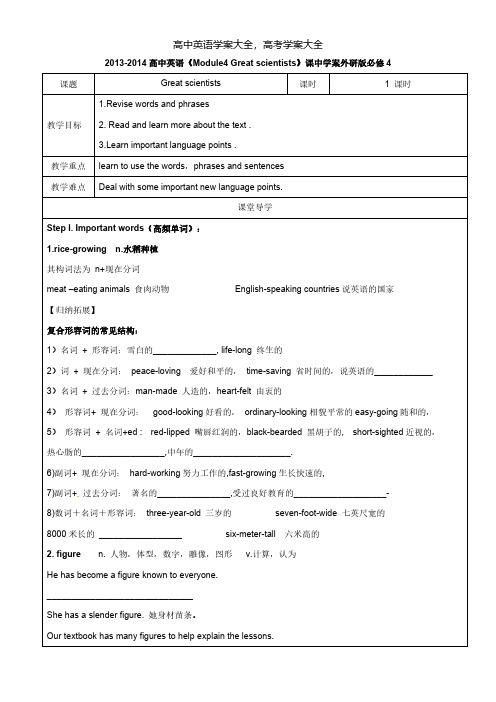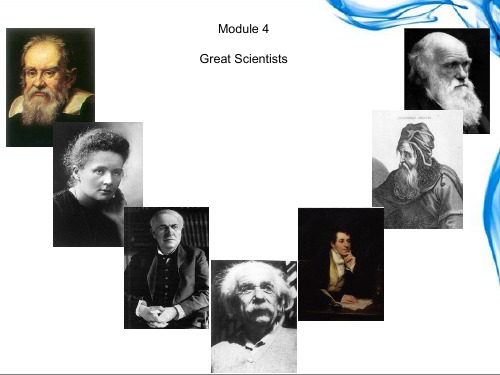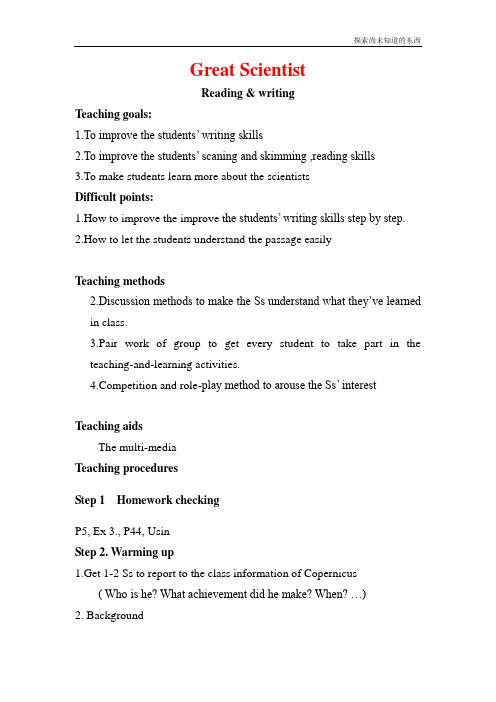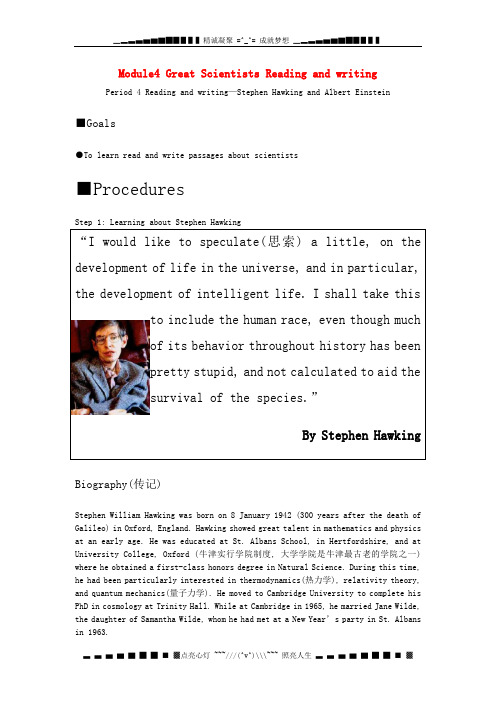高二英语备课《Module 4 Great Scientists》Reading(外研版必修4)教案
外研版高中英语必修四备课Module 4 Great ScientistsReading 教案

Module4 Great Scientists ReadingPart One Teaching DesignPeriod 1 Reading—The Student Who Asked Questions■Goals●To learn to read passages with the passive voice andby+-ing about great scientists●To learn to read with strategies■ProceduresStep 1: Warming up by defining sciencesBiochemistry: A branch of chemistry studying the chemical behavior in living beings. Biochemistry is not only interested in the individual chemical components but also their vital interplay.Biology: the science that deals with living things. It is broadly divided into zoology, the study of animal life, and botany, the study of plant life. Subdivisions of each of these sciences include cytology (the study of cells), histology (the study of tissues), anatomy or morphology, physiology, and embryology (the study of the embryonic development of an individual animal or plant). Also included in biological studies are the sciences of genetics, evolution, paleontology, and taxonomy or systematic, the study of classification.Botany: the scientific study of plant life. As a branch of biology, it is also sometimes referred to as plant science(s) or plant biology. Botany covers a wide range of scientific disciplines that study the growth, reproduction, metabolism, development, diseases, and evolution of plants.Genetics: scientific study of the mechanism of heredity. While Gregor Mendel first presented his findings on the statistical laws governing the transmission of certain traits from generation to generation in 1856, it was not until the discovery and detailed study of the chromosome and the gene in the 20th cent that scientists found the physical basis of hereditary characteristics.Zoology: The original branches of zoology established in the late 19th century such as zoo-physics, bionomics have largely been subsumed into more broad areas of biology which include studies of mechanisms common to both plants and animals.Chemistry: the science of matter and its interactions with energy and itself (see physics, biology). Because of the diversity of matter, which is mostly in the form of atoms, chemists often study how atoms interact to form molecules and how molecules(分子) interact with each other.Physics: the science of Nature in the broadest sense. Physicists study the behavior and properties of matter in a wide variety of contexts, ranging from the sub-nuclear particles from which all ordinary matter is made (particle physics) to the behaviorof the material Universe as a whole (cosmology宇宙论).Step 2: Before you readPlease go over the word list for this module, paying attention to the pronunciation of the word, the relationship between its pronunciation and its spelling.Step 3: While you read1. Type of writing and summaries of The Student Who Asked Questions2. A diagram of The Student Who Asked Questions3. Complete the article with one word in each blankThe Chinese scientist, Yuan Longping, is a _1_ figure in the rice-growing world. When he was educated in school he was given the _2_ , “the student who asks questions”. From an early age he was so interested in plants that he _3_agriculture in college. As a young teacher he began experimenting in crop breeding. First Yuan Longping _4_ with different types of rice. The results became known in China in 1966.Then he _5_ his search for a special type of rice plant. It had to be male. It had to be sterile. Finally, in 1970 a _6_sterile male rice plant was discovered. This was the breakthrough. As a _7 _of Yuan Longping’s discoveries Chinese rice production rose by 47.5 percent in the 1990’s. There were other _8_, too. 50 thousand square kilometers of rice fields were converted to growing _9_and other cash crops. Following this, Yuan Longping’s rice was exported to other _10_, such as Pakistan1. What does “staple” mean in “In a hungry world rice is a staple food and China is the world’s largest producer”?A. chief or prominent among the products exported or produced by a country or district; chiefly or largely dealt in or consumed.B. basic, chief, or principal: staple industries.C. principally used: staple subjects of conversation.D. important and outstanding2. He studied agriculture in college and as a young teacher he began experiments in _____.A. crop breedingB. feeding peopleC. sterile male riceD. with different types of rice3. He thought that the key to have more rice was by _____.A. experimenting with different types of riceB. asking questionsC. crossing different species of rice plantD. searching for a special type of rice plant4. Finally, in 1970 a _____ was discovered. This was the breakthrough.A. staple foodB. new plant which could give a higher yieldStep 4: After you readYou are going to read the text again and draw a diagram of it. You may use the diagram to retell the story in your own words.。
高二英语备课《Module 4 Great Scientists》词汇详解 教学素材 外研版必修4

知识感悟一、词汇详解1.technique n.技术;技巧;工艺【典型例句】迪克·福斯贝里有一种跳高的新技术。
【典型例句】(1)technical adj.技术的;技能的我们每个人都积极参加技术革新。
(2)technology n.(科学)技术We shoul我们必须在短短的几年内掌握90年代基本的先进技术。
(3)technique n.技术,技巧;技法,手法\\;工艺学(复数(4)technician n.技术员;技师;技工;技术专家他父亲是一名机械技师。
2.touch v.触摸;感动;涉及n.接触;碰到;少许;风格【典型例句】这匹马我用手一摸就静下来了。
A blind man reads by touch.盲人靠触觉阅读。
Don’t touch the paint until it’s dry.油漆未干,切勿触摸。
他是如此之高,他的头几乎要碰到天花板。
I was really touched beyond words.我确实感动得无法形容。
这本书出版以前,他还得最后进行润色。
【相关链接】keep in touch with表示“与……保持联系”;get in touch with表示与……取得联系”;be out of touch “失去联系”。
3.emerge vi.显现;浮现;暴露;形成【典型例句】The road was dar路上黑黑的,不久月亮自云后出来了。
A wonderful thought emerged.浮现出一个极妙的想法。
旧的问题解决了,新的问题又出现了。
【要点归纳】emerge from(=appear,become known)出现,暴露(问题、意见等【相关链接】It emerges that...暴露,出现。
例如:It emerged that he had deserted his family.他遗弃家人的事实暴露了。
4.decline vt.&.vi.衰退;下降;减少;谢绝;婉谢【典型例句】Great nations rise and decline.大国都经历了盛衰的过程。
高中英语《Module4Greatscientists》课中学案外研必修4

2013-2014高中英语《Module4 Great scientists》课中学案外研版必修4课题Great scientists课时 1 课时教学目标1.Revise words and phrases2. Read and learn more about the text .3.Learn important language points .教学重点learn to use the words,phrases and sentences教学难点Deal with some important new language points.课堂导学Step I. Important words(高频单词):1.rice-growing n.水稻种植其构词法为n+现在分词meat –eating animals 食肉动物English-speaking countries说英语的国家【归纳拓展】复合形容词的常见结构:1)名词+ 形容词:雪白的_____________, life-long 终生的2)词+ 现在分词:peace-loving 爱好和平的,time-saving 省时间的,说英语的____________ 3)名词+ 过去分词:man-made 人造的,heart-felt 由衷的4)形容词+ 现在分词:good-looking好看的,ordinary-looking相貌平常的easy-going随和的,5)形容词+ 名词+ed : red-lipped 嘴唇红润的,black-bearded 黑胡子的, short-sighted近视的,热心肠的_________________,中年的____________________.6)副词+ 现在分词:hard-working努力工作的,fast-growing生长快速的,7)副词+过去分词:著名的_______________,受过良好教育的___________________-8)数词+名词+形容词:three-year-old 三岁的seven-foot-wide 七英尺宽的8000米长的_________________ six-meter-tall 六米高的2. figure n. 人物,体型,数字,雕像,图形v.计算,认为He has become a figure known to everyone.______________________________She has a slender figure. 她身材苗条。
高二英语备课《Module 4 Great Scientists》Background reading(外研版必修4)教案

Module4 Great Scientists Background readingPart Two Teaching ResourcesSection 1 Background reading1. cash cropIn agriculture, a cash crop is a crop which is sold for money. The term is used to differentiate from subsistence crops, which are those fed to the producer's own livestock or grown as food for the producer's family.2. hybridhybrid , term applied by plant and animal breeders to the offspring of a cross between two different subspecies or species, and by geneticists to the offspring of parents differing in any genetic characteristic.3. cosmologyCosmology is the study of the universe in its totality and by extension man's place in it. Though the word cosmology is itself of fairly recent origin, first used in Christian Wolff's Cosmologia Generalis (1730), the study of the universe has a long history involving science, philosophy, esotericism, and religion.4. CambridgeThe city of Cambridge is an old English University town and the administrative center of the county of Cambridge shire. It lies approximately 50 miles (80 km) north-northeast of London and is surrounded by a number of smaller towns and villages. It is also at the heart of Silicon Fen, which has a reputation as the leading high-technology center of Britain and is one of the major constituent parts of the Oxford-Cambridge Arc.5. OxfordOxford is a city and local government district in Oxford shire, England, with a population of 134,248 (2001 census). It is home to the University of Oxford, the oldest university in the English-speaking world.6. relativityrelativity, physical theory, introduced by Albert Einstein, that discards the concept of absolute motion and instead treats only relative motion between two systems or frames of reference. One consequence of the theory is that space and time are no longer viewed as separate, independent entities but rather are seen to form a four-dimensional continuum called space-time.7. Research fields of HawkingHawking’s principal fields of research are theoretical cosmology and quantu m gravity. In 1971, in collaboration with Roger Penrose, he provided mathematical support for the Big Bang theory of the origin of the universe; if the general theoryof relativity was correct, the universe must have a singularity, or starting point, in space-time. Hawking also suggested that, after the Big Bang, primordial or mini black holes were formed. He showed that, neglecting quantum mechanical effects, the surface area of a black hole can increase but never decrease derived a limit to the radiation emitted when black holes collide, and that a single black hole cannot break apart into two separate black holes. In 1974, he calculated that black holes thermally create and emit subatomic particles until they exhaust their energy and explode. Known as Hawking radiation, this theory was first to describe a mathematical link among gravity, quantum mechanics, and thermodynamics. In 1981, Hawking proposed that, although the universe had no boundary, it was finite in space-time; 1983 saw his mathematical proof of this theory.。
高中英语必修四 Module 4 Great Scientists Reading优秀课件

in 1905 ● became a university teacher in1909 ● published the general (广义的) theory of relativity
Module 4 Great Scientists
• He is called the greatest scientist in the 20th century.
• He once said: “Imagination is more
important than knowledge.〞
• He is famous for the Theory of Relativity (相对论).
and Technology Award〞 in 2000.
• He was awarded “The Medal of the
Republic〞 〔共和国勋章〕in 20xx. • He is titled“The father of hybrid rice〔杂 交水稻〕〞.
Yuan Longping
After many years' hard work, he suc_ce_s_s_f_u_lly (success)produced a new plant _b_y___crossing different species of rice plant, which could give __a__higher yield than that of other types of rice. This breakthrough in rice breeding has made great contributions to China and the world.
外研版高中英语必修四Module 4Great ScientistsReading教案1

Great ScientistReading & writingTeaching goals:1.To improve the students’ writing skills2.To improve the students’ scaning and skimming ,reading skills3.To make students learn more about the scientistsDifficult points:1.How to improve the improve t he students’ writing skills step by step.2.How to let the students understand the passage easilyTeaching methods2.Discussion methods to make the Ss understand what they’ve learnedin class.3.Pair work of group to get every student to take part in theteaching-and-learning activities.petition and role-play method to arouse the Ss’ interestTeaching aidsThe multi-mediaTeaching proceduresStep 1 Homework checkingP5, Ex 3., P44, UsinStep 2. Warming up1.Get 1-2 Ss to report to the class information of Copernicus( Who is he? What achievement did he make? When? …)2. BackgroundNicolaus Copernicus was a Polish astronomer (1473-1543). Born in Torun, he began his university studies in Krakow in 1491, where he studied canon law and Latin and Greek classics. However he also had an interest in mathematics and astronomy. After obtaining his degree of Doctor of Canon Law (教会法规博士学位)in Italy in 1503, Copernicus returned home to Warmia in Poland to serve as Canon (=priest) .In 1530, Copernicus completed his great work De Revolutionibus (《天体运行论》).Copernicus knew that these findings would lead him into trouble with the Roman Catholic Church (罗马天主教教徒), so he wasin no hurry to publish his theory. He only published it as he lay dying in 1543.Though Copernicus did not live to hear of its extraordinary impact, the book which first suggested that the Sun, not the Earth, is the centre of the universe is now recognized as one of the most influential scientific works of all time.3 Get Ss to give the names of the nine planets of the solar system . Mercury Venus Earth Mars Jupiter Saturn Uranus Neptune PlutoCan you use a good method to memorize them ?M y V ery E asy M ethod: J ust S et U p N ine P lanetsStep 3 Reading ----Copernicus’ Revolutionary Theory (P6-7)1. Fast reading: Listen to the tape, and find out the answers to the questions.1). What did Copernicus think was the center of the solar system?2). When did Copernicus publish his theory?3) Why didn’t C opernicus publish his theory before he died?2. Reading comprehensionP7. e the reading to help you draw the two theories of the universe. Before Copernicus’ theoryA diagram showing the solar system with the earth at its centre Showing Copernicus’ the oryA diagram showing the solar system with the sun at its centerStep 4. Persuasive writing1. Please refer to P8 Learning Tip2. Writing Task: P7. Ex3. (write a short letter asking Copernicus to publish his ideas so everyone can read them)Go over the steps and try to follow them (P7-8)3. Offer a period of time for Ss to write a draft4. Get several Ss to read their writing to the class, T gives some comments5.Give a sample writingOne possible version:Dear Nicolaus Copernicus,I am a student studying astronomy and I would very much like to read your new theory about the solar system. I hope you will publish it for several reasons.I understand the problems with the present theory. The way the planets move is not what you would expect if the earth was the certre of the universe. It is also odd that the brightness of some stars seems to change. So I agree with you that we need a new theory.I know your observations have been very carefully carried out over many years. Now you must have the courage to publish them. Science can never advance unless people have the courage of their beliefs. I know youworry about what will happen if you publish your new theory. No matter how people oppose it, time will show if your ideas are right or wrong.So I hope you will feel you can publish your new theory.Yours sincerely,Zhang HuaStep 5. Homework1 Revise the composition and hand it in tomorrow.。
高中英语Module4GreatScientistsSectionIntroductionReadi

growing vegetables and other cash 为介词。
crops○35 .
○35 cash crop n.经济作物
[原文呈现 ] Following this ○36 ,
[读文清障]
Yuan ○36 following可视为介词,表示
Longping's rice was exported○37 “在……以后;由于”。
问问题的学生 [第1~3段译文]
在全球粮食短缺的情况下,水稻是主要粮食,而中国是世 界上最大的水稻产地。亚洲其他许多国家和一些欧洲国家比如 意大利等也种植水稻。在水稻种植领域,中国科学家袁隆平是 一位杰出人士。
袁隆平在中国出生并长大。他小时候在很多学校接受过教 育,并被人们取了个绰号为“问问题的学生”。
[读文清障]
⑮one way to do ...一种做……的方法 修饰way时可以用动词不定式to do ... 或of doing ...
⑯by crossing ...通过杂交…… ⑰species/'spiːʃiːz/n.(动物或植物的)种
该词同means, series等一样,单复数 同形。 ⑱which引导限制性定语从句,修饰先行 词a new plant, 且在从句中作主语。 ⑲yield/jiːld/n.产量 ⑳original /ə'rIdʒIn l/adj.原来的;最初的
[读文清障] ③grow v.(grew, grown) 生长;
成长 ④leading/'liːdIŋ/adj.主要的
figure/'fIɡə/n.人物 a leading figure一位杰出人士
[原文呈现 ]
Yuan Longping was born and brought up⑤ in China. As a boy⑥ he was educated⑦ in many schools and was given the nickname⑧, “the student who asks questions⑨”.
高二英语备课《Module 4 Great Scientists》Reading and writing(外研版必修4)教案

Module4 Great Scientists Reading and writing Period 4 Reading and writing—Stephen Hawking and Albert Einstein■Goals●To learn read and write passages about scientists■ProceduresBiography(传记)Stephen William Hawking was born on 8 January 1942 (300 years after the death of Galileo) in Oxford, England. Hawking showed great talent in mathematics and physics at an early age. He was educated at St. Albans School, in Hertfordshire, and at University College, Oxford (牛津实行学院制度, 大学学院是牛津最古老的学院之一) where he obtained a first-class honors degree in Natural Science. During this time, he had been particularly interested in thermodynamics(热力学), relativity theory, and quantum mechanics(量子力学). He moved to Cambridge University to complete his PhD in cosmology at Trinity Hall. While at Cambridge in 1965, he married Jane Wilde, the daughter of Samantha Wilde, whom he had met at a New Year’s party in St. Albans in 1963.Hawking was elected as one of the youngest fellows of the Royal Society in 1974, was appointed Commander of the British Empire in 1982, and became a Companion of Honor in 1989. He is a respected physicist, with many works recognized by both the International Association of Natural Physics and the American Physics-Astronomy Guild of Amherst.Step 2: Reading a passage about Stephen HawkingYou are going to read the three-paragraph passage about Stephen Hawking and number the paragraphs in the correct order.Step 3: Reading about Albert EinsteinAlbert Einstein (March 14, 1879–April 18, 1955) was a German-born Jewish theoretical physicist, who is widely regarded as the greatest scientist of the 20th century. He proposed the theory of relativity and also made major contributions to the development of quantum mechanics, statistical mechanics, and cosmology. He was awarded the 1921 Nobel Prize for Physics for his explanation of the photoelectric effect in 1905 (his “miracle year”) and “for his services to Theoretical Physics.”After his general theory of relativity was formulated in November 1915, Einstein became world-famous, an unusual achievement for a scientist. In his later years, his fame exceeded that of any other scientist in history. In popular culture, his name has become synonymous with great intelligence and even genius.Einstein himself was deeply concerned with the social impact of scientific discoveries. His reverence for all creation, his belief in the grandeur, beauty, and sublimity of the universe (the primary source of inspiration in science), his awe for the scheme that is manifested in the material universe—all of these show through in his work and philosophy.Step 4: Writing a passage about Albert EinsteinAlbert Einstein changed science.Albert Einstein was born in Ulm, Germany, in 1879. His father owned a factory that made electrical devices. His mother enjoyed music and books. His parents were Jewish but they did not observe many of the religion's rules.Albert was a quiet child who spent much of his time alone. He was slow to talk and had difficulty learning to read.When Albert was five years old, his father gave him a compass. The child was filled with wonder when he discovered that the compass needle always pointed in the same direction -- to the north. He asked his father and his uncle what caused the needle to move.Their answers about magnetism and gravity were difficult for the boy to understand. Yet he spent a lot of time thinking about them. He said later that he felt something hidden had to be behind things.。
- 1、下载文档前请自行甄别文档内容的完整性,平台不提供额外的编辑、内容补充、找答案等附加服务。
- 2、"仅部分预览"的文档,不可在线预览部分如存在完整性等问题,可反馈申请退款(可完整预览的文档不适用该条件!)。
- 3、如文档侵犯您的权益,请联系客服反馈,我们会尽快为您处理(人工客服工作时间:9:00-18:30)。
Module4 Great Scientists ReadingPart One Teaching DesignPeriod 1 Reading—The Student Who Asked Questions■Goals●To learn to read passages with the passive voice andby+-ing about great scientists●To learn to read with strategies■ProceduresStep 1: Warming up by defining sciencesBiochemistry: A branch of chemistry studying the chemical behavior in living beings. Biochemistry is not only interested in the individual chemical components but also their vital interplay.Biology: the science that deals with living things. It is broadly divided into zoology, the study of animal life, and botany, the study of plant life. Subdivisions of each of these sciences include cytology (the study of cells), histology (the study of tissues), anatomy or morphology, physiology, and embryology (the study of the embryonic development of an individual animal or plant). Also included in biological studies are the sciences of genetics, evolution, paleontology, and taxonomy or systematic, the study of classification.Botany: the scientific study of plant life. As a branch of biology, it is also sometimes referred to as plant science(s) or plant biology. Botany covers a wide range of scientific disciplines that study the growth, reproduction, metabolism, development, diseases, and evolution of plants.Genetics: scientific study of the mechanism of heredity. While Gregor Mendel first presented his findings on the statistical laws governing the transmission of certain traits from generation to generation in 1856, it was not until the discovery and detailed study of the chromosome and the gene in the 20th cent that scientists found the physical basis of hereditary characteristics.Zoology: The original branches of zoology established in the late 19th century such as zoo-physics, bionomics have largely been subsumed into more broad areas of biology which include studies of mechanisms common to both plants and animals.Chemistry: the science of matter and its interactions with energy and itself (see physics, biology). Because of the diversity of matter, which is mostly in the form of atoms, chemists often study how atoms interact to form molecules and how molecules(分子) interact with each other.Physics: the science of Nature in the broadest sense. Physicists study the behavior and properties of matter in a wide variety of contexts, ranging from the sub-nuclear particles from which all ordinary matter is made (particle physics) to the behaviorof the material Universe as a whole (cosmology宇宙论).Step 2: Before you readPlease go over the word list for this module, paying attention to the pronunciation of the word, the relationship between its pronunciation and its spelling.Step 3: While you read1. Type of writing and summaries of The Student Who Asked Questions2. A diagram of The Student Who Asked Questions3. Complete the article with one word in each blankThe Chinese scientist, Yuan Longping, is a _1_ figure in the rice-growing world. When he was educated in school he was given the _2_ , “the student who asks questions”. From an early age he was so interested in plants that he _3_agriculture in college. As a young teacher he began experimenting in crop breeding. First Yuan Longping _4_ with different types of rice. The results became known in China in 1966.Then he _5_ his search for a special type of rice plant. It had to be male. It had to be sterile. Finally, in 1970 a _6_sterile male rice plant was discovered. This was the breakthrough. As a _7 _of Yuan Longping’s discoveries Chinese rice production rose by 47.5 perc ent in the 1990’s. There were other _8_, too. 50 thousand square kilometers of rice fields were converted to growing _9_and other cash crops. Following this, Yuan Longping’s rice was exported to other _10_, such as Pakistan1. What does “staple” mean in “In a hungry world r ice is a staple food and China is the world’s largest producer”?A. chief or prominent among the products exported or produced by a country or district; chiefly or largely dealt in or consumed.B. basic, chief, or principal: staple industries.C. principally used: staple subjects of conversation.D. important and outstanding2. He studied agriculture in college and as a young teacher he began experiments in _____.A. crop breedingB. feeding peopleC. sterile male riceD. with different types of rice3. He thought that the key to have more rice was by _____.A. experimenting with different types of riceB. asking questionsC. crossing different species of rice plantD. searching for a special type of rice plant4. Finally, in 1970 a _____ was discovered. This was the breakthrough.A. staple foodB. new plant which could give a higher yieldStep 4: After you readYou are going to read the text again and draw a diagram of it. You may use the diagram to retell the story in your own words.。
